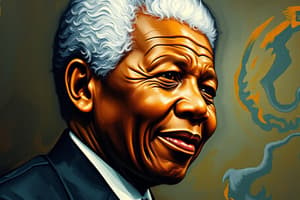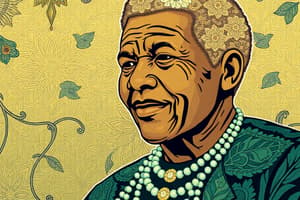Podcast
Questions and Answers
What was Nelson Mandela's attitude towards leadership, as described in the text?
What was Nelson Mandela's attitude towards leadership, as described in the text?
- Leadership is about enforcing authority and control.
- Leadership is about position, power, and prestige.
- Leadership is about promoting division and inequality.
- Leadership is about inspiring, empowering, and advocating for a just and equitable world. (correct)
What was the significance of Nelson Mandela's actions during his imprisonment?
What was the significance of Nelson Mandela's actions during his imprisonment?
- He remained committed to the struggle against apartheid despite enduring brutal conditions. (correct)
- He focused on self-preservation and did not engage in any political activities.
- He collaborated with the apartheid regime to secure his early release.
- He abandoned his fellow inmates to ensure his own survival.
Which of the following best describes Nelson Mandela's role in the transition from apartheid to democracy?
Which of the following best describes Nelson Mandela's role in the transition from apartheid to democracy?
- He advocated for the continuation of apartheid policies.
- He played a pivotal role in negotiating the end of apartheid and forging a new constitution. (correct)
- He opposed any negotiations with the apartheid regime.
- He sought to prolong his imprisonment rather than lead the transition.
What was one of the key lessons that Nelson Mandela's leadership legacy teaches?
What was one of the key lessons that Nelson Mandela's leadership legacy teaches?
How did Nelson Mandela view the potential impact of individuals on the world?
How did Nelson Mandela view the potential impact of individuals on the world?
What were the cornerstones of Nelson Mandela's leadership philosophy?
What were the cornerstones of Nelson Mandela's leadership philosophy?
Which values were at the core of Mandela's leadership beliefs?
Which values were at the core of Mandela's leadership beliefs?
Who was a significant influence on Nelson Mandela's leadership approach?
Who was a significant influence on Nelson Mandela's leadership approach?
What type of society did Nelson Mandela advocate for through his leadership?
What type of society did Nelson Mandela advocate for through his leadership?
How did young Nelson Mandela's early influences shape his leadership philosophy?
How did young Nelson Mandela's early influences shape his leadership philosophy?
Flashcards are hidden until you start studying
Study Notes
Nelson Mandela: An Enduring Symbol of Leadership
The name Nelson Mandela has become synonymous with courage, resilience, and unwavering commitment to a cause. A towering figure in the struggle against apartheid in South Africa, Mandela's life and legacy also embody powerful lessons in leadership. Let's explore the facets of his leadership that continue to inspire generations, highlighting his vision, perseverance, and the transformative impact of his actions.
Early Influences and Ideals
Born Rolihlahla Mandela on July 18, 1918, in the Transkei region of South Africa, young Nelson was drawn to the teachings of his schoolmaster, a principal who emphasized the importance of education and exposure to diverse cultures. These early influences instilled in him a passion for equality, justice, and the rights of all people, which became the cornerstones of his leadership philosophy.
Leadership Philosophy
Mandela's leadership beliefs were rooted in the values of non-violent resistance, peaceful coexistence, and the pursuit of a just society for all. He believed in the power of collaboration, advocating for dialogue, compromise, and understanding between opposing sides. Mandela often cited his admiration for Mahatma Gandhi as a major influence on his approach to leadership, stating, "My own struggle was in fact a part of the world-wide politicalawakening".
Challenges and Sacrifice
Mandela's path to leadership was paved with adversity and personal cost. In 1964, he was sentenced to life imprisonment for his activities against the apartheid regime. Despite enduring brutal conditions and 27 years of incarceration, Mandela remained steadfast in his commitment to the struggle. His unwavering resolve and unyielding spirit were a testament to his leadership capabilities, inspiring his fellow inmates and the broader anti-apartheid movement.
The Road to Reconciliation
In 1990, Mandela was released from prison, and he rose to the challenge of leading the transition from apartheid to democracy. He played a pivotal role in negotiating the end of apartheid, forging a new constitution, and promoting national reconciliation. His leadership in these efforts paved the way for South Africa's first democratic election in 1994, which saw him elected as the country's first black president.
Legacy and Lessons
Nelson Mandela's leadership legacy extends far beyond the borders of South Africa. His unwavering commitment to justice, equality, and peace continues to inspire and guide leaders and activists worldwide. His approach to leadership emphasized the importance of collaboration, compromise, and understanding. He also demonstrated the power of non-violent resistance and the transformative impact of perseverance, courage, and resilience.
As we reflect on Nelson Mandela's life and legacy, we are reminded that leadership is not simply about position, power, or prestige. Instead, it is about inspiring, empowering, and advocating for a just and equitable world. Mandela's leadership philosophy, grounded in the pursuit of peace, justice, and equality, serves as a powerful reminder that each individual has the potential to make a positive impact in the world.
In the words of Nelson Mandela himself, "There is no passion to be found playing small – in settling for a life that is less than the one you are capable of living." Let us strive to embody the leadership lessons of Nelson Mandela, embracing our potential and working together to create a more just and inclusive world.
Studying That Suits You
Use AI to generate personalized quizzes and flashcards to suit your learning preferences.






